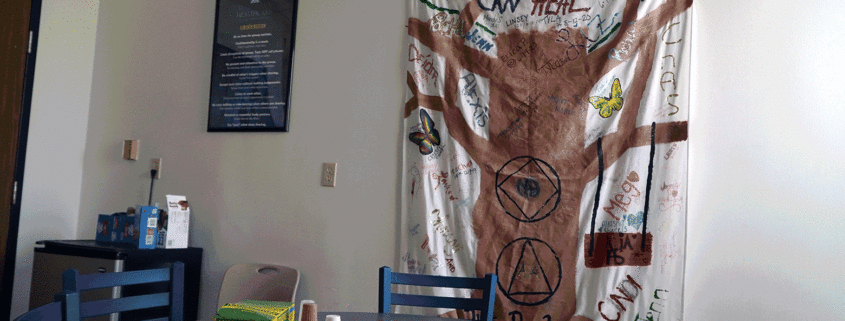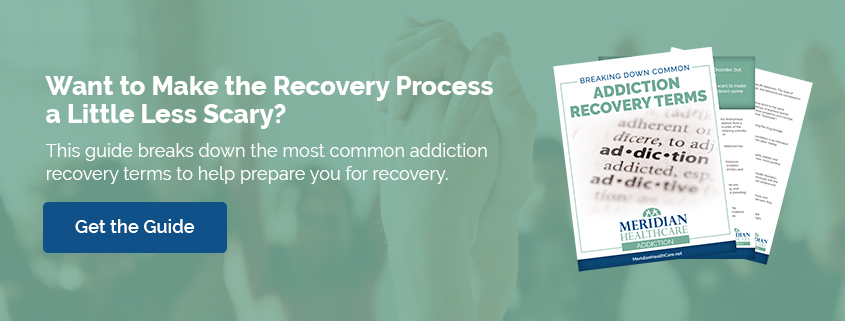What Is Rehab — and Will It Lead to Addiction Recovery?
You may have heard the terms “rehab” and “detox” used interchangeably, but they are not necessarily the same. What is rehab? It refers to the entire process of rehabilitation and recovery from addiction, while detox is a step in the recovery process.
Detox, a withdrawal management program, is a step of addiction treatment for those struggling with alcohol use or drug addiction. It involves 24/7 medical care and support for a short amount of time – typically between 3 and 7 days.
Rehab often combines the detox process with therapy, counseling, and other resources. It can include outpatient treatment (living at home while getting treatment) or inpatient treatment (staying in a rehabilitation facility during treatment, often referred to as residential treatment).
Disclaimer: If you or a loved one are struggling with an addiction, reach out to a mental health and addiction expert to talk through recovery options together.
*If this is an emergency situation, call 911.
How Does Detox Work in Addiction Treatment?
Detoxification is the first step in the addiction recovery process. Detox (otherwise known as withdrawal management) is a medically supervised process that helps the body rid itself of the harmful effects of drugs and alcohol.
During this time, withdrawal symptoms often occur as your body adjusts to not absorbing those substances anymore, and at times, symptoms can be severe. A detox program allows individuals to receive 24-hour medical care and peer support from experienced nursing staff in a controlled environment.
Common Withdrawal Symptoms
-
- Headaches
- Nausea or vomiting
- Sweating, fever, chills
- Restlessness or anxiety
Detox is an important part of alcohol rehab and substance abuse treatment — but it’s extremely difficult on your own. This type of treatment works best as part of an inpatient rehabilitation program so that healthcare providers can assess withdrawal symptoms and offer support.
When to Seek Addiction Treatment
Addiction is a complex disease. While addictions are commonly drug or alcohol-related, they can also form around a number of substances or actions, including gambling. The first step to getting treatment is acknowledging that there is a problem.
If you’re not sure if you have a gambling, drug, or alcohol addiction (or any addiction), here are some signs to look for:
- You spend more time and money on your addiction than on other things in life, such as hygiene or work obligations.
- You have trouble controlling how much or how often you partake in your addiction.
- You try but fail multiple times at quitting and struggle with withdrawal symptoms after attempts.
If you are at the point where you acknowledge a problem and are looking for sober living, it’s time to contact a professional. They will work with you to design an addiction treatment program that’s tailored to your personal needs and situation. Rehab treatments vary on a variety of circumstances that influence whether an inpatient program or outpatient program will be most effective.
*If you or a loved one is struggling with an addiction, contact a trusted, compassionate addiction treatment center.
Inpatient vs. Outpatient Treatment
There are two main types of rehab: inpatient and outpatient. Inpatient rehab programs (also referred to as residential treatment programs) involve the patient staying at a rehab center during treatment. This option is available for patients who need intense treatment and support and typically includes interventions like group therapy, individual counseling, education, recreation, and more while living in the rehab facility.
Intensive outpatient rehab programs, by comparison, do not require the patient to live within a facility. These programs offer education and aid in developing strong support systems. Outpatient programs often include both group and individual therapy sessions with periodic drug screens.
A person with an addiction may also benefit from aftercare services after completing their initial program. Aftercare can help them maintain healthy habits and prevent relapse after inpatient rehab.
Addiction Treatment Options
Rehabilitation centers help people with substance use disorders recover from their addictions and improve well-being while incorporating group therapy, individual counseling sessions, meditation classes, music therapy, educational sessions and more. Treatment plans can include everything from detox and medication assisted treatment to counseling and therapy sessions.
Aftercare / Support Groups
Aftercare support groups like Alcoholics Anonymous (AA) or Narcotics Anonymous (NA) support people long after they finish their initial treatment plan. Members meet regularly to support each other’s journey to sobriety. Talking with people who understand the ups and downs of the recovery process is helpful to not feel alone. Plus, watching others find sobriety firsthand is both encouraging and inspiring.
Family Therapy
Family therapy helps family members and loved ones support their sober living goals. A reliable support system is critical in effective addiction recovery — and it starts with family members and other loved ones.
Cognitive Behavioral Therapy (CBT)
Cognitive-behavioral therapy benefits those struggling with addiction to manage their emotions and positively impact their recovery. CBT is especially helpful for individuals with co-occurring mental health conditions, such as anxiety, attention deficit disorder (ADD), bipolar disorder, obsessive-compulsive disorder (OCD), eating disorders, and post-traumatic stress disorder (PTSD).
Mental Health Services
Substance use disorder often coexists with other mental health conditions like depression and anxiety. According to the National Institute on Drug Abuse, “as many as six in ten people with an illicit substance use disorder also suffer from another mental illness.” Counseling and treatment for the underlying mental illness will aid in recovery.
Medication-Assisted Treatment (MAT)
Medication-assisted treatment is used to aid in opioid addiction recovery. This type of treatment aims to avoid intense withdrawal symptoms without risking relapse. MAT programs require random drug screens and intensive counseling therapies, as well as involvement in other recovery activities with medical provider supervision.
Find Hope for Recovery
Finding the right treatment can be overwhelming, whether you’re looking for alcohol treatment, drug rehab, or to free yourself from compulsive gambling. Keep in mind that the rehabilitation process is a journey. There are many options, and it’s easy to get lost in all of them if you don’t know where to start.
So, what is rehab? Well, every recovery journey is unique, and there may not be a right answer that fits everyone. That’s why it’s important to seek out treatment options that are based on a person-centered approach, with caring, compassionate, experienced medical staff overseeing every step of the process. When you or a loved one is ready for help fighting addiction, Meridian HealthCare will be there to pick up the call.






